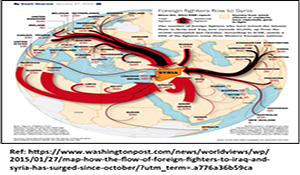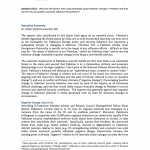Behavior Changes in Pakistan

Question (QL1): What are the factors that could potentially cause behavior changes in Pakistan and how can the US and coalition countries influence those factors?
Author | Editor: Astorino-Coutois, A. (NSI, Inc).
The experts who contributed to this Quick Look agree on an essential point: Pakistan’s beliefs regarding the threat posed by India are so well-entrenched that they not only serve as the foundation for Pakistan’s foreign policy and security behavior, but represent a substantial barrier to changing it behavior. Christine Fair a Pakistan scholar from Georgetown University is specific as to the target of any influence efforts – difficult as they may be: “the object of influence is not ‘Pakistan;’ rather the Pakistan army’ and so security behavior change if possible requires change in the Army’s cost-benefit calculus. The essential components of Pakistan’s security beliefs are first that India is an existential threat to the state; and second that Pakistan is at a tremendous military and economic disadvantage to its stronger neighbor. Tom Lynch of the National Defense University adds a third: Pakistan’s national self-identity as an ‘oppositional state, created to counter India.’ The nature of behavior change is relative and can occur in (at least) two directions: one aligning with the observer’s interests (for the sake of brevity referred to here as ‘positive change’), and one in conflict with those interests (‘negative change’). Encouraging positive change in Pakistani security behavior was seen by each of the experts as an extremely difficult challenge, and one that would likely require dramatic change in Pakistan’s current internal and external security conditions. The experts also generally agreed that negative change in Pakistani behavior is easily generated with no need for dramatic changes in circumstance.
Negative Change: Easy to Do
According to long-time Pakistan scholar and Atlantic Council Distinguished Fellow Shuja Nawaz, Pakistan’s current state is to “to view its regional interests and strategies at a variance from the views of the US and its coalition partners.” Moreover, Pakistan’s willingness to cooperate with US/Western regional objectives can deteriorate rapidly if the Pakistani security establishment believes those states have dismissed as invalid, or take actions that exacerbate their concerns. Specifically, actions that reinforce the perceived threat from India (e.g., Indian military build-up, interest in Afghanistan) or Pakistan’s inferior position relative to India (e.g., US strengthening military and economic ties with India; Indian economic growth) stimulate negative change. Importantly, because the starting point is already “negative” relative to US interests, these changes can take the form of incremental deterioration in relations, rather than obvious and dramatic shifts in behavior. Examples may include increased emphasis on components of Pakistan’s existing nuclear weapons program, amplified use of proxy forces already in Afghanistan, or improved economic relations with Russia.
Levers Encouraging Positive Change: A difficult Challenge
While the experts agreed that Pakistan’s deep-rooted, security-related anxieties inhibit changes in behavior toward greater alignment with coalition objectives; they clearly diverge on what, if anything might be done to encourage positive change. Two schools of thought emerged: what we might (cheekily) refer to as a “been there” perspective; and a longer- term, cumulative influence view.
“Been there” School of Thought
Tom Lynch (NDU) argues that the security perceptions of Pakistan’s critical military- intelligence leaders have been robustly resistant to both pol-mil and economic incentives for change2 as well as to more punitive measures (e.g., sanctions, embargos, international isolation) taken to influence Pakistan’s security choices over the course of six decades. Neither approach fundamentally altered security perceptions. Worse yet, punitive efforts not only failed to elicit positive change in Pakistan’s security framework but ended up reducing US influence by motivating Pakistan to strengthen relations with China, North Korea and Iran. As a consequence of past failure of both carrot and stick approaches, both Lynch and Christine Fair (Georgetown) argue that motivating change in Pakistani security behavior requires “a coercive campaign” to up the costs to Pakistan of its proxy militant strategy (e.g., in Afghanistan by striking proxy group leaders; targeted cross-border operations)3. Moreover, Lynch feels that positive behavior change ultimately requires a new leadership. Raising the costs would set “the conditions for the rise of a fundamentally new national leadership in Pakistan” and be the first step in inducing positive behavior change. Lynch believes these costs can be raised while at the same time US engagement continues with Pakistan – in a transactional way with Pakistan’s military-intelligence leadership and in a more open way through civilian engagement and connective projects with the people of Pakistan. However, Christine Fair points to US domestic challenges that mitigate against the success of even these efforts given what she argues is a lack of political will “in key parts of the US government which continue to nurse the fantasy that Pakistan may be more cooperative with the right mix of allurements.”
Cumulative Influence School of Thought
Other contributors however believe are not ready to abandon the possibility of incentivizing positive change in Pakistan’s foreign policy and security behavior. They argue that there are still actions that the US and coalition countries could take to reduce Pakistani security concerns and encourage positive change. Admittedly, the suggested measures are not as direct as those suggested by abeen there, done that approach and assume a significantly broader time horizon:
- Do not by-pass civilian authority. Equalize the balance of US exchanges with Pakistani military and civilian leaders rather than depending largely on military-to-military contact. Governing authority and legitimacy remain divided in Pakistan, and while dealing directly with the military may be expedient, analysis shows that by-passing civilian leadership and continuing to the treat the military as a political actor inhibits development of civilian governing legitimacy, strengthens the relative political weight of the military, and will in the longer term foster internal instability in Pakistan and stymie development of the civil security, political and economic institutions necessary for building a stronger, less threatened state.4 In this case the short-term quiet that the military can enforce, is off-set by increased instability down the road.
- Reduce the threat. A direct means of reducing the threat perceptions that drive Pakistani actions unfavorable to coalition interests is to actually alter the threat environment. One option suggested for doing this is to use US and ally influence in India to encourage that country to redirect some of the forces aimed at Pakistan. A second option is to develop a long-term Pakistan strategy (“not see it as a spin-off or subset of our Afghanistan or India strategies”) was seen as a way to signal the importance to the US of an enduring the US-Pakistan relationship.
- Remember that allies got game. Invite allies to use their own influence in Pakistan rather than taking the lead on pushing for change in Pakistan’s behavior. According to Shuja Nawaz, “…the Pakistanis listen on some issues more to the British and the Germans and Turks. The NATO office in Islamabad populated by the Turks has been one of the best-kept secrets in Pakistan!”
- Enlist Pakistan’s diplomatic assistance. Finally, Raffaello Pantucci of the Royal United Services Institute (UK) suggests enlisting Pakistan to serve as an important conduit in the dispute that could most rapidly ignite region-wide warfare: that between Saudi Arabia and Iran. Pakistan has sectarian-based ties with Saudi Arabia as well as significant commercial ties with Iran. Although as MAJ Shane Aguero points out increased Saudi-Iranian hostilities could put Pakistan in an awkward position, Pantucci believes that the US and allies could leverage these relations to open an additional line of communications between the rivals. Importantly, doing so would also important signal US recognition of Pakistan’s critical role in the region, which would enhance “Pakistani sense of prestige which may in turn produce benefits on broader US and allied concerns in the country.”
Contributing Authors
Nawaz, S. (Atlantic Council South Asia Center), Abbas, A. (National Defense University), Lynch, T. (Institute of National Strategic Studies – National Defense University),
Aguero, S. (US Army), Venturelli, S. (American University), Pantucci, R. (Royal United Services Institute), Fair, C. (Georgetown University)

Comments